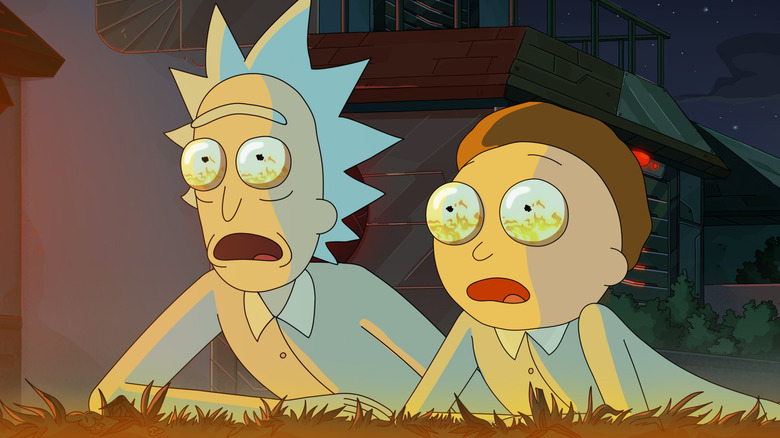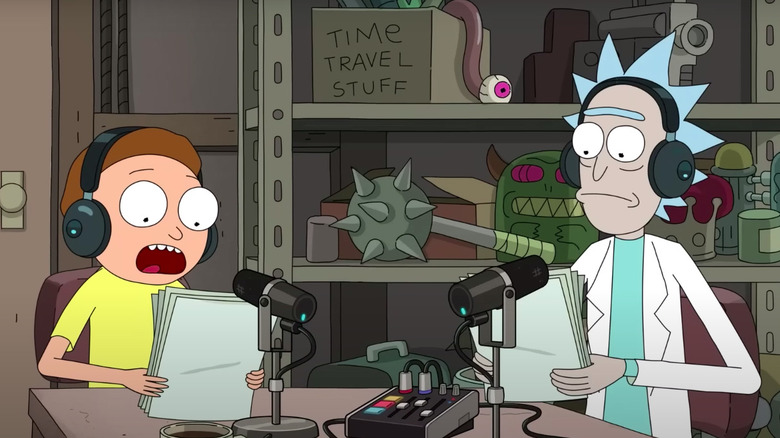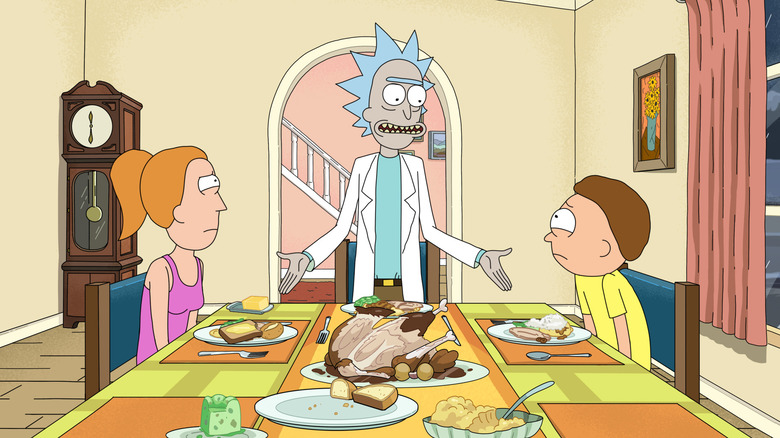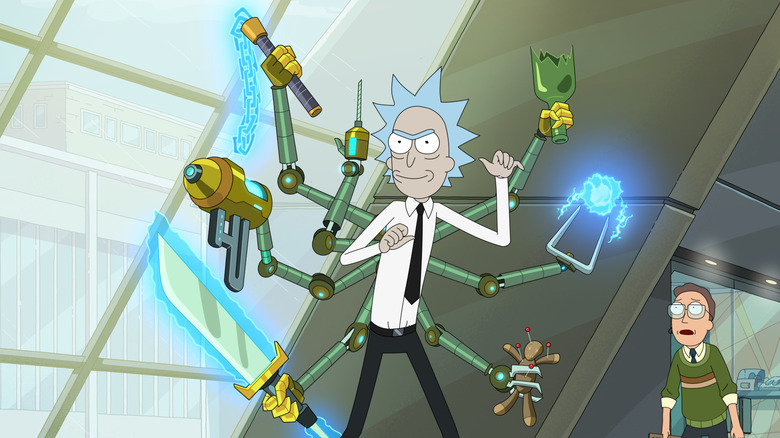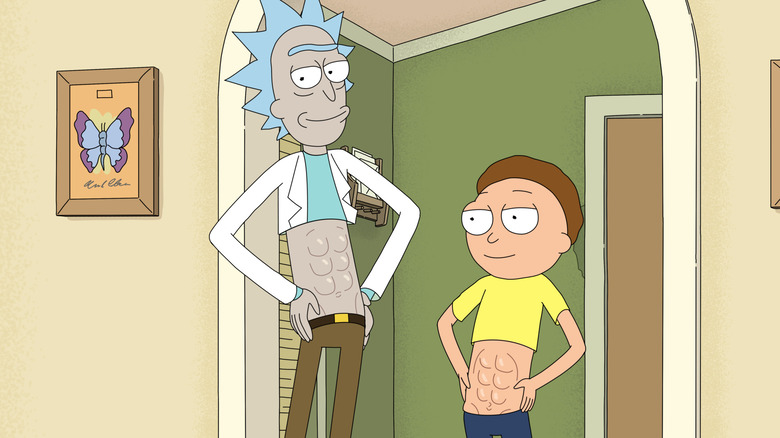Rick And Morty's Dan Harmon And EP Scott Marder On Sustaining The Show's Quality, Perfecting The Comedy & More [Interview]
"Rick and Morty" is coming up on its sixth season, which begins September 4, 2022 on Adult Swim. But the show actually started 10 years ago, and those early years were rather difficult for co-creators Dan Harmon and Justin Roiland. Thankfully, a guaranteed order of 70 episodes back in 2018 (with 40 left to complete after the sixth season concludes later this year) made it much easier for the series to maintain a proper schedule. In fact, things are going so smoothly that both Roiland and Harmon have been able to step away from the show somewhat. Don't worry, they're still very much involved with the creative direction of the show, both serving as executive producers, not to mention Roiland's essential involvement as the voices of the two titular leads. But the show has another executive producer in the form of Scott Marder, whose previous credits include "It's Always Sunny in Philadelphia" and "BoJack Horseman," and "Rick and Morty" hasn't missed a beat.
Ahead of the sixth season premiere, we spoke with Harmon and Marder about the challenges of maintaining the quality of the show amid such great popularity, the collaborative process of working with the animators, facing multiverse challenges head-on, and much more.
This interview was conducted in a virtual roundtable with two other outlets, and it has been lightly edited for clarity.
'Creative work is really, truly facilitated by limitation'
You both are so accomplished in both animation and live-action. What's most challenging for you, personally, on an animated project compared to live-action?
Harmon: Boy, I think the most challenging thing compared to live-action is that, with live actors, you get to do a million takes and then carry those into an edit bay. It's just sort of a different kind of challenge. It's not more challenging or less challenging, but the challenging part of animation is that you are making artists labor over an idea. They have to build a new set, as it were, if you decide that a scene should be different. Trying to manage your own resources when you're creating everything from scratch is a bigger challenge than just being able to say, "Let's gather these actors together, have them play make-believe, we'll capture it all on 20 cameras over 100 takes, and then we'll sort it out in the edit bay."
Marder: But just to piggyback on that, I was going to say the same thing: putting the pencil down. Because in that live-action shoot, ultimately, you got what you got and that's for good or bad, often not reshooting. Whereas in animation, we could tweak it right up to air. They don't prefer it, but we could if we had to, and that could be difficult.
But doesn't that give you a chance to affect things creatively much farther down?
Marder: 100%, yeah. Huge pros and cons to it.
Harmon: Yeah, that's the challenge, though, I imagine. Creative work is really, truly facilitated by limitation. The rules of a sonnet actually make it easier to write a sonnet, because you at least know that you can't have over these syllables. But [with] animation, you just have that power, like, "Oh, am I just getting bored with this scene, or has this scene always been boring? And should I swap it out for an entirely new scene?" As opposed to just going, "Alison Brie looks great and is very funny in this scene. The lighting's great. That's already been shot. They're not going to re-shoot it. How do I edit this?"
'The challenge for me has been in trusting collaborators'
Dan, what is it about Scott that has made you trust him in such a significant role on this series, as you and Justin have stepped back a little bit? And Scott, what's been the biggest challenge of inheriting such a behemoth of a show from Dan and Justin?
Harmon: Look, Scott was a gamble. I didn't know him from anything, but his resume said unflappability. He was used to working in chaos with limited resources and maintaining a schedule. His first few weeks at work only confirmed that, because he came on season 5 and then was helping us finish season 4. So by the end of season 5, it was very clear that this was an indispensable person. So that's my answer to that.
Marder: For me, it's a pretty simple answer. The hardest part's just maintaining the quality, which was really, really high. That was the thing that was most daunting to me. It was one of my absolute favorite shows on TV coming in, so the last thing you want to do is take that job and be the guy that brought it down. So it was just wanting to make sure that we were maintaining a really high bar.
I'm always really interested in the kind of long-running comedies that we have today, both animated and live-action. So for Dan, is there any difference in creating the show at this point, when you've reached an age of the show where its own mythology and past episodes can be their own kind of sustainable, closed circuit reference point? And for Scott, you've seen comedic sensibilities evolve over things like ["It's Always Sunny in Philadelphia"], which is a distinct example of comedy evolving as it's going on, with those guys learning things. What's it like to come into the series at this point for you, and what are your goals on taking that evolution to the next step?
Harmon: Yeah, there's a huge difference for me in the show being established and being its own thing. The easy thing for me to do — actually, it's not that easy, because I'm a control freak and an ego maniac, but I'm also lazy. The challenge for me has been in trusting collaborators, because I'm 49 and the show is 10 years old, so what is its hope of staying fresh and relevant? The answer is younger writers and not me going away but me deferring, trusting them, listening to them. They're more in touch with the public's response to the show. I can't Google it or I'll go nuts. So it's like a clutch and a gas pedal or a clutch and, yeah, clutch and gas. I haven't driven stick in a long time. But it's kind of like, evening the rhythm, like the amount of deference to younger writers as I slowly [back away] but without me unplugging from the show. My wisdom has to start replacing what used to be me being like, "It has to be like this, because I'm passionate. I care about TV. I'm 32 years old. Me, me, me." You don't want a 49-year-old guy doing that, because then he becomes a villain. So I try to become Uncle Gandalf and say —
Marder: That's what we call him.
Harmon: "I did this a long time ago. So I can tell you what's going to be difficult about it. Let's figure this out."
Marder: For me, to piggyback on that, I feel like I knew I couldn't do it alone. So it was certainly trying to find the people that could help push this boulder up a mountain. There had been a good amount of turnover previously, so it was trying to find continuity in young talent and young voices that cared as much as Dan and I do to kind of help join us in moving it forward. I feel like we've been really successful in that.
'As a sci-fi fan and just like a fan of psychology, I just love that everybody's now able to access this idea of an infinite multiverse'
How much does the new season take advantage of any new production tech or processes that have either allowed for greater efficiency or maybe have allowed you to take the show to some new places visually? Maybe some richer layouts or things that maybe you weren't able to do before or tools that have made things easier?
Harmon: Scott's more production adjacent, so if there's been techniques or improvements ...
Marder: I'd say there's probably better internal bookkeeping on people being able to grab assets from previous seasons. There's more vertical, like, "Oh, we got a thing from season 2. Let's just grab that. That's fully ready to go." All that access is a lot stronger than it used to be. I think people used to have to rebuild a lot of things that you would've thought would've just been at the ready. The production staff itself has also just grown immensely, in that we aren't burning any one particular person out anymore. Every department is huge and can handle the load of multiple seasons at the same time, so we can keep things going yearly. That's probably our biggest thing, just that production's probably doubled or tripled.
You mean just in aggregate size?
Just in sheer size, so that any one person can't be a thing that's slowing down the juggernaut.
The multiverse and storylines inspired by it have now gone mainstream. We've got big blockbuster franchises jumping into this now. As somebody who's struggled and kind of dealt with the headache and also the fun of telling multiverse stories, how do you feel watching some of these big franchises like Marvel or DC jumping into this storytelling pool in film and TV?
Harmon: It feels fantastic. As an earthling, I'm just so happy that now we [...] have a shorthand for the idea of infinite universes. Also, I feel blessed and lucky that we were in on the ground floor of it. We did not invent it, as everybody knows. We stole it from comic books and science, then Marvel was only reclaiming it by starting to incorporate it into the [Kevin] Feige universe, which has been done so great.
There's an added layer of pride there, because Chris McKenna, who co-wrote that amazing Spider-Man movie ["No Way Home"], he was a mastermind behind the timeline episode of "Community," and an old dear, beloved friend and collaborator. It's just so cool to watch our single universe move forward in that way. It's one of the most satisfying things, because as a sci-fi fan and just like a fan of psychology, I just love that everybody's now able to access this idea of an infinite multiverse. It feels great.
Marder: Yeah. I feel for them, too. It's challenging. It's not like an easy road to hoe; that's really challenging.
Harmon: Well, it is hard, too, yeah. I figure the challenges of it are in finding stakes, because if you overpower your characters to just reset or just find a different universe to hang out in — Marvel, I think, maintains that by making it come at a heavy price all the time. It's very uncontrollable, the specifics of what happens. It's more driven by an almost spiritual kind of destiny and things like that.
In "Rick and Morty," the challenge is, if this dude can just do that, why doesn't he just leave right now? And the nice answer is usually like, "Well, let's not avoid that. Let's not try to solve that problem. What would happen if he did leave?" So sometimes we do that, it was just like, "Let's have him leave. Let's have him go home. He doesn't want to be here if he can, let's just have him go home or to a different timeline and reset." We had that conversation as early as season 1. That was a big "Rick and Morty" birth moment for us, going, "Let's not be afraid of jumping this shark. Let's have him move to a new earth in episode 2 or something."
'I know that we've gotten more and more confident in our collaboration with the art team'
How much of the humor on the show doesn't hit as much as you would like until it's actually animated? How much of the comedy comes to life in animation where you're like, "I didn't even know it could be that funny," after you see it? Or is it more like, "If they just animate what we give them, it's going to be great."
Harmon: That's an interesting question. I know that we've gotten more and more confident in our collaboration with the art team, to the point where we sometimes will leave entire chunks of an episode and just say, "Look, we're writers, you're artists. Go crazy with this. The idea is this." I mean, the "Vat of Acid Episode," the entire sequence where Morty is resetting his game saves, that was all just this dream of the artists. It's a board-driven instead of a script-driven experience. But I think you're asking a different question, which is how much of it needs to get all the way to the end of the production line before we know whether it's hitting or missing.
There's a bunch of stuff that we, to our dismay, we don't know if something isn't working until we get all the way to the end, and it's anyone's guess what it's going to be, where we're like, "Ugh, this doesn't make any sense or this isn't funny. We need to redo this." But for the most part, we have to keep on trying to make it hit. That's what the whole process is. That's how we're able to be on schedule, by actually letting things go a little bit that maybe aren't perfect on the page. Then we make these poor animators draw it, and then we watch a version of it played out and we go, "Eh, this isn't quite working." I'm sure most of them roll their eyes and go, "Yeah, no crap. Of course it wasn't working. Why don't you make the script better?" And the answer is, "Because then we'll hold you up and make everybody late." I don't know if that was a good answer, but I'm going to stick with it.
That's a good answer. Scott, what about you?
Marder: I feel like our best directors give us a pretty good idea of what's working pretty early on, and there's often nice surprises where it's like, "Oh, I didn't exactly see it from that particular angle," or whatever. It's like, "Awesome. That's a treat." Things that I might have felt lukewarm on, going off to [the animators], and them bringing it back like, "No, I saw it, and I ran with it a little bit." That's a dream that makes our jobs a little easier. Like Dan said, there's tons of fight scenes that they bring so many little nuanced little gags or things that [enhance] them and make our lives a lot easier. So there's a lot of appreciation there, because it's a hard job. It's great to have a collaborator that can add so much extra stuff to our stuff.
The sixth season of "Rick and Morty" premieres at 11:00pm ET/PT on September 4, 2022 on Cartoon Network's Adult Swim.
